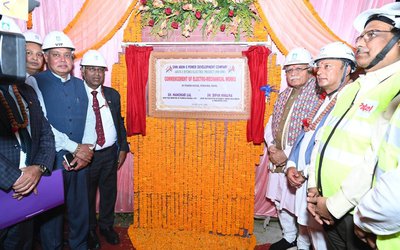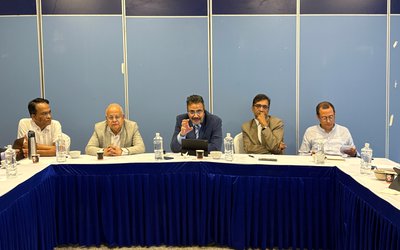
When a mother shows her children to a laborer from school, the fear of showing them that if they do not study, they will have to do the same labor to eat, the discrimination towards the laborers starts. Studying and sweat are completely different, until the fact that educated people are not laborers and do not work is removed, there will not be a comfortable working environment in Nepal, we all need to pay attention to this.
It is important to explain to the new generation that the worker who comes to pick up the garbage is not dirty and if he does not pick up the garbage, we cannot live cleanly.
Labor Day in Nepal is celebrated on May 1, 2023. It is celebrated as a day to recognize the efforts of all working class people and workers who work to improve the economy and meet the needs of the common people and the system.
“World Day for Safety and Health at Work 2023” A safe and healthy working environment is a fundamental principle and a right to work.
At a glance, the basic demands of the promotion of professional interests and job security, including eight hours of work, eight hours of rest and eight hours of recreation, were established from the struggle in the city of Chicago, USA, which established the belief that the state should protect the workers' class interests, job security, and services and facilities.
Commemorating the same day, every year on May 1, World Labour Day is celebrated. On the occasion of the 134th International May Day, it is also an opportunity to express warm congratulations and best wishes to all the workers working in the private sector of Nepal, the industry sector of Nepal and the industrial, commercial, service, agricultural and informal sectors of Nepal.
May 1 is celebrated as May Day and is also known as International Labours' Day around the world. The day is celebrated as an opportunity to commemorate the contribution of workers and the working class.
This day is declared as a national holiday in many countries. It is also called International Labor Day in Nepal. In many countries around the world, this day commemorates the labor movement that brought about various reforms, including the eight-hour workday and paid holidays. During industrialization in the early nineteenth century, the working class in the United States was exploited by industrialists and forced to work up to 15 hours a day. This forced the workers to raise their voices against exploitation and demanded paid holidays, fair wages and breaks for the workforce.
May 1 was chosen as International Labor Day in 1886 to commemorate the Haymarket Incident in Chicago. The members of the labor union went on a peaceful strike demanding working hours from fifteen to eight, fair wages, paid holidays, etc. However, the strike was met with bomb blasts that killed many. Many protesters were arrested and faced life imprisonment, the death penalty. This incident is believed to have given great support to the labor movement. In the late 19th century, eight hours of legal work time was announced by the American Federation of Labor at its national convention in Chicago.
After this announcement, many countries, including Nepal, have adopted the policy of working eight hours. The country is moving towards building a socialist-oriented economy by ensuring the country's constitutional system.
It seems that the government of Nepal is committed to maintaining the basic values of human rights and democracy. In order to maintain the maximum level of occupational safety and health in the workplace, it is important to have an overall baseline picture of the current workplace scenario, the various hazards and their potential health consequences. Occupational accidents are very common in Nepal and most of them are related to finger, hand, head, and eye, palm and foot injuries. However, there is no doubt that the under-reporting of such incidents in Nepal has not given a true picture of the workplace.
Occupational safety and health issues are becoming major challenges in Nepal due to unsafe work environment. crowded workplace; lack of supervision, monitoring and training; Negligence in government inspection, monitoring and supervision systems, ignorance and carelessness of workers and employers, use of old or outdated machines or equipment, lack of regular maintenance and repair of equipment, machines and equipment, lack of standard quality safety equipment, violation of safety regulations and inappropriate conditions. etc. are the major factors I It is widely accepted that workplace safety is an essential component of efficiency and productivity. In the working environment, the worker must be able to ensure that the necessary safety equipment is provided. Often, it is workers in developing countries who face security problems. Current situation of occupational safety and health in Nepal Illness or accident to the worker can have negative consequences. While the employer loses a worker who is used to his job. The employee pays the price with many problems within and outside his family. There are employers who try to do well while many of them do not meet the minimum standards. The government must intervene to ensure safety in such workplaces
Employers should be prepared to invest in technology, tools and equipment for OSH. The government must play its role in establishing a catalyst for change in this sector. Government, employers and employees should create awareness on meaningful dialogue and implementation strategies. Investing in the future of Nepal means investing in the safety of workers.
Agriculture is the main feature of Nepal's economy. But the proportion of employment provided by this sector is gradually decreasing. As the role of the industrial sector is not satisfactory, the situation of the service sector, construction and transportation is gradually increasing.
In this context, economic development is far from the current trend of industrial development. In such an initial economic development of the country, the occupational safety and health (OSH) of workers should be given due importance.
Industrial development is undoubtedly the basis of sustainable economic development as well as a self-sustaining economy. The experience of developed countries has proved it. Since the beginning of the democratic era in Nepal (since 1950), the government of Nepal has emphasized the fact that the history of modern industry began in 1936 during the Rana regime.
Most of the industries established in the country are agro-processing. Only a few are producing basic building materials, import substitution and export oriented products.
Due to rapid urbanization in the country as well as physical infrastructure development, apart from the manufacturing sector, hotels and tourism, waste disposal, transport and construction are the most important sources of non-agricultural employment for multi-skilled workers. The profession of scavenging has traditionally been limited to certain castes.
In view of the need to develop the promotion and protection of safe work and working conditions in industrial establishments as a complementary basic aspect of industrial business, the then government established the "Occupational Safety and Health Project" in 2052.
The 19th century is known as the century of labor and workers, with the beginning of this century, various factories, industries, production and new dimensions of development have begun, the importance of workers and working groups in this industry and industrialization and the fair value of labor is very important to advocate around the world today.
From the perspective of Nepal, history is a witness that the movement from 2007 to 2046 and 2063 years would not be successful without the support of Nepali labor brothers and sisters.
From the perspective, now the definition of labor has become wider, many of us Nepalis are not included in this wide scope.
The remittances coming from foreign labor have supported Nepal's economy, in this sense, most of the taxes we wear, eat, and run the country are the result of the sweat of those working brothers and sisters. Despite the government's innumerable efforts, foreign employment has not been easy, while inside the country, the painful situation of laborers is also prevailing. It would not be an exaggeration to say that this is an opportunity for all stakeholders to be active in order to improve the relationship between workers and employers in accordance with the legal provisions mentioned in the Constitution of Nepal and the prevailing laws and create an environment in which the money accumulated in the social security fund is used for the benefit and efficiency of the workers.
On this historic day, it is also expected that the government, workers, consumers and employers will have a new awareness to move towards the economic development of the country.
Labor humiliates no man; Unfortunately, sometimes we see those who insult labor. The constitution guarantees the right to social security based on fair wages, facilities and contributions.
The constitution has adopted the provision that every worker has the right to practice labor and to open and participate in trade unions and to engage in collective bargaining. The Labor Act, 2074 has been issued and implemented to regulate the rights, interests and facilities of workers, to develop good labor relations by clearly regulating the rights and duties of workers and employers, and to end all remnants of labor exploitation.
In addition, the Trade Act, 2049 has been implemented to protect and promote the commercial and professional rights and interests of workers.
The Civil Service Act 2049 has also further institutionalized the rights of trade unions. The civil relations act as a law should also pay attention to it. An official trade union has been established for the professional rights and security of the employees. Nepal has ratified the ILO convention. Institutionally, the Ministry of Labour, Employment and Social Security has been managed.
The workers participating in the social security scheme will now receive financial assistance under the medical treatment, health and maternity protection scheme, accident and disability protection scheme, dependent family protection scheme and old age protection scheme.
The damage to jobs and livelihoods will be unprecedented. This year, on the occasion of International labours' Day or May Day, workers around the world, including Nepal, are in a challenging situation. laboures who have gone to work abroad in Nepal have also come under the scope of social security.
The government has brought the workers who have gone abroad under the scope of the social security fund through the operation procedure of the social security scheme. Now the workers who are employed abroad will be able to receive the services provided by the fund after contributing a minimum of 2 thousand 2 rupees per month.
Even though the country is running on annual remittances of more than 10 billion from foreign employment, it has been criticized for not being able to respect the workers. Now the government respects the sentiments of the workers and has brought it into the scope of social security.
According to the recently approved procedures, anyone who is or is going abroad has to contribute 21.33 percent of the minimum basic salary set by the government, i.e. at least 2 thousand 2 rupees to the fund. Likewise, they can participate by contributing to the fund up to three times of the basic salary. Even though the Nepal government started the social security scheme on 11th November 2075, it collected contribution amount from 1st July 2076.
In a period of almost four years, 17 thousand employers and 4 lakh workers have joined the fund.
From Baishak 1st, the informal sector and self-employment have also been brought under the scope of social security by the fund.
On the one hand, it is necessary to build a self-sufficient economy by increasing the national production in Nepal, on the other hand, for the economic prosperity of the country, the contribution of the entrepreneurs who invest their capital and the workers who invest their labor and the development of entrepreneurship in the country are equally important. For this, there is an urgent need to increase productivity by creating a decent working environment. Who is the most hit?
Among the workers, daily wage earners working in the unorganized or informal sector, workers in the construction sector and workers involved in small businesses are seen to be the most vulnerable.
At the same time, according to ILO figures, the jobs of more than one and a half billion such workers worldwide are at risk. In the absence of any alternative income, the livelihood of these workers and their families will be in crisis.
Millions of people work in the unorganized sector in Nepal. Also, it is said that it has been decided to help such workers by giving them some relief measures .
- Nepal’s recent Economic Growth: Critical observations ?
- Apr 12, 2025
- “Kolahalko Kolaj “: A Collection Of Scattered Memories By Prakash Sayami
- Apr 02, 2025
- Nepal-India Trade, Transit And Unauthorized Trade: Some Considerations
- Jan 16, 2025
- PM Oli’s Forthcoming Visit To China: Will The Achievement Be Complete?
- Nov 29, 2024
- Obituary To Dr. Mohan Man Sainju!
- Nov 02, 2024















